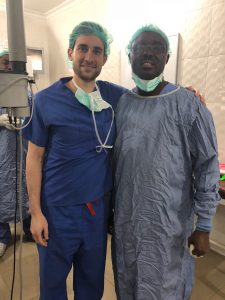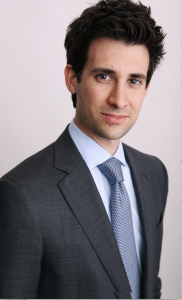Transitioning from a retina fellowship to your first job, whether academic or private practice, has a learning curve. Each day is a new day. RetinaLink met Dr. Michael N. Cohen when he was a second-year fellow at Tufts and Ophthalmic Consultants of Boston (OCB) in Boston, MA.
Dr. Cohen attended Cornell University (Ithaca, NY) for his undergraduate degree, went to medical school at the NYU School of Medicine (New York, New York), then spent three years at Wills Eye Hospital (Philadelphia, PA) for his residency, followed by two years in Boston for his vitreoretinal fellowship. During his fellowship, he had the privilege of working with incredibly gifted Attendings, including Drs. Jay Duker, Jeffrey Heier, Elias Reichel, Chirag Shah, Caroline Baumal, Adam Rogers, Andre Witkin, Nadia Waheed, Michael Morley, Torsten Wiegand, Tina Cleary, Miriam Englander, Michelle Liang, David Reed, and Anthony Joseph, and Shilpa Desai. His experiences with the diverse group of physicians and surgeons help guide his influence on patient care and surgical planning. Ultimately, we were interested in one question: What is it like when you are totally on your own?
Dr. Cohen provides his insight and perspective one year after completing his fellowship. He is practicing at NJ Retina, seeing patients and operating in several locations in northern New Jersey.
RetinaLink (RL): Please describe key highlights from your Attendings.
Michael N. COHEN, MD (MNC): During fellowship you observe, absorb, and learn – those are your true objectives. To get the most from your fellowship, you will take something unique from each Attending and use that to help mold you into the physician you aspire to be. Additionally, you should identify practice patterns, methodologies, and surgical approaches that are most similar to your own in those who you look up to the most. You start shaping how you will operate and treat patients in your own clinic based on all of these factors. The key before you leave fellowship is to start mentally preparing and identifying these important takeaways as early as possible.
RL: Outline what you have learned your first year out of fellowship.
MNC: I think the farther you get from fellowship, the more appreciation and respect you have for all of your Attendings. In practice, you are responsible for all facets clinically and surgically – everything falls on your shoulders. It’s such a simple and obvious realization, but the weight of that situation creates a vastly different feel to your daily routine. Not having a safety net of an experienced Attending watching over your shoulder certainly leads to more anxiety. I think there is a shift towards more conservative medicine, with closer interval follow up and more reliance on ancillary testing. Fortunately, as months progress, the anxiety lessons and things become more routine – as they did in fellowship.
From a surgical perspective – that’s the most striking transition. I operate without a fellow in either a surgery center or a hospital setting. Not having another surgeon by your side forces independent decision making in an OR setting that is a stark contrast when compared to operating with an Attending. I can’t stress the importance of appropriate pre-operative planning to ensure that you don’t encounter anything unexpected in the OR.
RL: What is your best advice for second year fellows searching for their first job?
MNC: You need to consider what is optimal for you and your family. That translates to what is needed for you to be happy. There are always so many factors at play when making such important decisions, but location, people, opportunities, availability to participate in clinical trials, opportunity to train fellows, all play an important role in our long term career paths. You should identify which factors are most valuable to you and make your decision with those in mind.
RL: Describe your experience in Ghana and the humanitarian efforts during your mission.
MNC: I was fortunate that my fellowship, with the organization of Unite for Sight, sponsored a medical mission trip to Ghana, in which we saw patients, operated, and taught vital aspects and techniques of vitreoretinal surgery to a surgeon on the ground there.

(L to R) Dr. Michael N. Cohen and Dr. Michael E. Gyasi
St. Thomas Eye Hospital in Accra, Ghana
When evaluating that experience, it’s impossible to view it from just one perspective. From a humanitarian point of view, the opportunity to give back in any way to a community less fortunate is an incredible experience. It was both heartwarming and heart breaking to see how appreciative our patients there were for anything we were able to do and how lucky we are in the United States compared to other parts of the world. You do feel, on some level, that there are so many other, large-scale, public health issues (fresh water, sewage systems, air quality, paved roads), that Retina surgery can feel like just a small drop in a bucket. You can be left wondering if you were able to truly do enough when there is so much more than can be done.
From a surgical experience, it was invaluable. You have an opportunity to operate in a new, unfamiliar setting. In dealing any expected issues that arise, it forces you to think critically and quickly – making you learn and adapt the way you’ll need to do as an Attending. At the same time, you are charged with imparting as much surgical knowledge, and channeling your Attendings, in the most helpful way possible. Ultimately, the most important goal should be to teach key surgical concepts and techniques so the impact on patients can be felt long after we return home.
RL: What do you recommended as the most junior retina specialist in your group?
MNC: Think about your first few years out of fellowship as Fellowship Part II. You are learning and assimilating into your new group, work environment, and referral base. You want to work as much as you can to be the best physician you can be. Take the extra holiday call, take the extra weekend call, take the extra surgeries, be motivated and eager. At the same time, don’t forget balance – the importance of spending time with the people you care the most about can’t be understated.
RL: How do you evaluate new surgical technology or the opportunity to participate in a new clinical trial?
MNC: Especially in the world of Retina, everyone loves technology. My theory is – the more technology the better. I feel like we should continue to push the envelope forward and trust that we will find a way to implement the technology in our daily practice if it is something truly valuable. You want new surgical technology to raise the bar of what you can visualize or what you can achieve surgically. I feel like those innovations are the most exciting.
When evaluating a new clinical trial, I feel like this is very data driven. Participating in clinical research is an essential aspect of daily life of a retina specialist. You want to be able to evaluate the merits of each trial you might have the opportunity to participate in, so you can be certain it’s a good fit for your practice and your patient population.
Dr. Cohen can be reached via e-mail at MCohen@njretina.com

